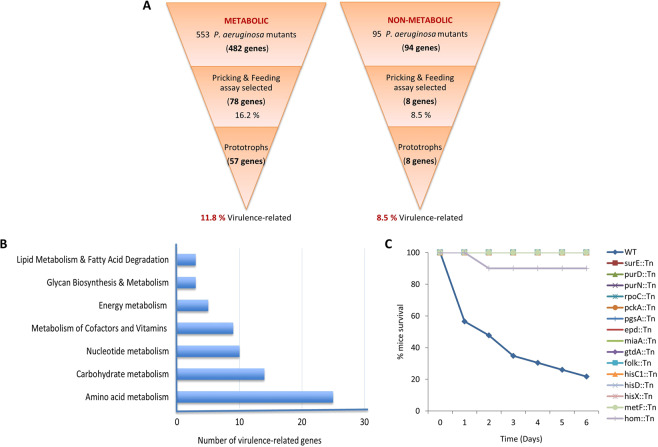Figure 4.
P. aeruginosa core metabolism genes are abundantly represented among genes required specifically for full virulence in flies and mice. (A) Five hundred and fifty-three (553) P. aeruginosa metabolic Tn-mutants corresponding to 482 core metabolism genes and 95 randomly selected non-metabolic P. aeruginosa Tn-mutants corresponding to 94 non-metabolic genes were screened in the wound and oral infection Drosophila assays. Sixteen percent (16.2%) of the core metabolism and 8.5% of the non-metabolic P. aeruginosa genes were selected as required for full virulence. Examination of growth capacity of the selected mutants in minimal media and in the host revealed the percentage of core metabolism genes dispensable for growth, i.e. important specifically for full virulence, is at least as high as that of the non-metabolic genes. (B) Assignment of the 57 PA14 virulence-related metabolic genes in metabolic categories. The 57 core metabolism P. aeruginosa gene mutants that grow normally in minimal media and/or in the host belong in one or more of 7 general core metabolism categories. Each category is represented by at least 3 virulence-related genes, while nucleotide, carbohydrate and amino acid metabolism categories by 10 or more. (C) Survival kinetics of mice after intranasal inoculation with PA14 metabolic mutants. The graph shows the % mice survival after intranasal inoculation with 15 PA14 metabolic mutants and the wild type strain. All strains, but wild type PA14 (blue) and hom (light purple), overlap on the horizontal 100% survival line. Twenty-microliter of saline containing 2 × 107 bacteria was administered intranasally to each mouse. Infected mice were monitored for 6 days (n = 10–11).

